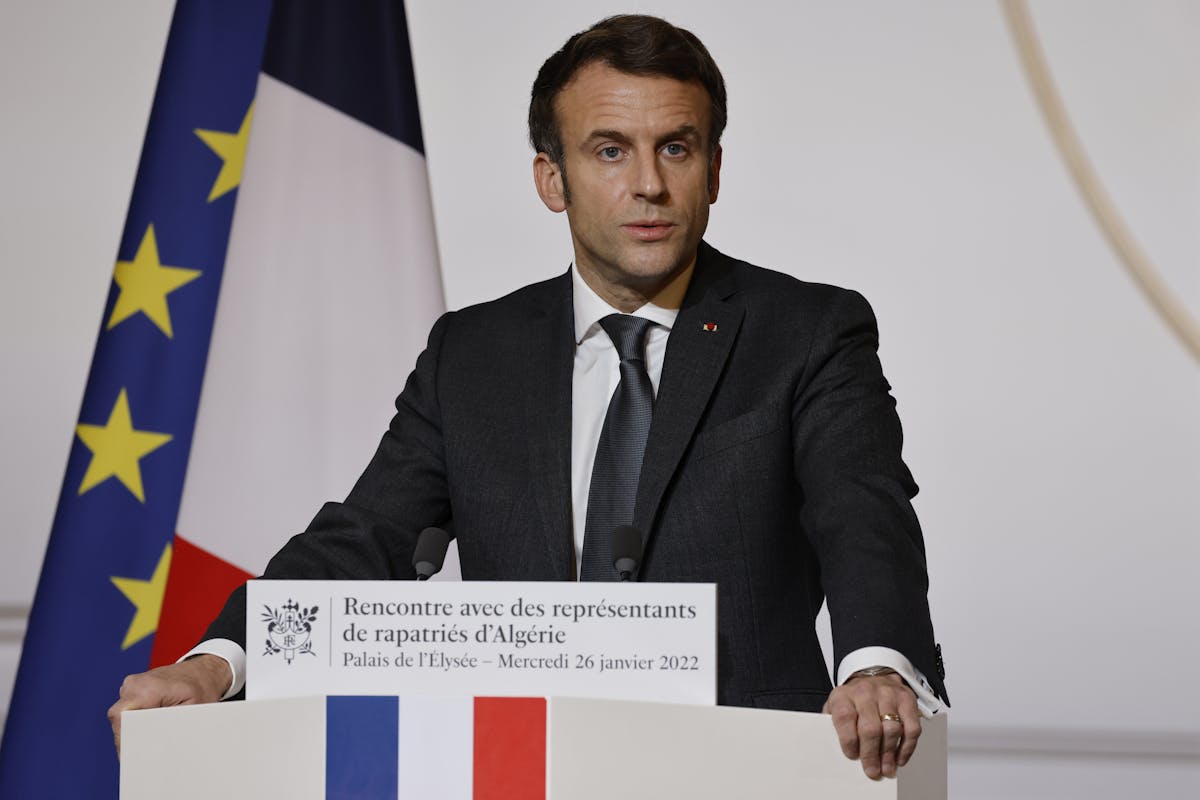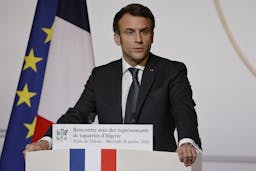For Emmanuel Macron, the Presidency of France Is Plan B
As Europe teeters on what could be its biggest crisis since World War II and China menaces the continent from the east, Macron seems to believe his time has come.

Emmanuel Macron wanted to be a writer. As a young man, the future French president believed writing to be his “only vocation.” At the age of 16, he penned a novel, “Babylon, Babylon,” a supposedly daring work set in 16th-century Mexico, rife with eroticism and human suffering.
Other than Mr. Macron’s wife, Brigitte, and a few close friends, no one has seen it. He studied philosophy at the Sciences Po and worked as an archivist for a French philosopher, Paul Ricoeur. Eventually, Mr. Macron became a politician.
In “Revolution,” Mr. Macron’s 2016 presidential campaign tract and sole published work to date, he confesses, “I cannot really explain this trajectory. I see only the result, which, fundamentally, is always a work in progress, of a long-standing undertaking and an all-embracing taste for freedom.” Rare is the protagonist who sees the presidency as Plan B.
Yet Mr. Macron’s unrealized ambitions are in many ways a window into his politics. They teeter on the transcendental, the theoretical — ostensibly better suited for the intrigues of literary fiction and Ricoeur’s phenomenology than the management of political affairs.
In his dashed hopes of becoming an immortel (as the 40 members of the Académie Française, with their engraved swords and feathered bicornes, are known), there is also an air of conceit.
Mr. Macron is obsessed with symbolism. His presidential portrait includes a copy of de Gaulle’s war memoirs, Stendhal’s “Le Rouge et le Noir,” two iPhones, and a golden clock — representing Mr. Macron’s claim to be the master of time. His regal entrance to the Palace of Versailles for a joint session of the National Assembly and Senate is another example. Mr. Macron appears to see himself as destined for greatness and to be frustrated at its delayed arrival.
As Europe now teeters on what could be its biggest crisis since World War II and China menaces the continent from the east, Mr. Macron seems to believe his time has come.
Last week, he held a flurry of bilateral telephone conversations with Presidents Putin, Zelensky, and Raisi. He spoke with Mr. Putin again on Monday. “You are the only one with whom I can have such a deep discussion,” Mr. Putin told Mr. Macron — a piece of arrant flattery that was relayed to Politico by a “senior Elysée official.”
With Germany having ostensibly abdicated the leadership of Europe, Mr. Macron has been swift to move in. To an extent, his activism aims to bolster his appeal ahead of the April presidential elections. Currently just 24 percent intend to vote for him in the first round.
Yet to attribute Mr. Macron’s politicking to electoral politics is an obfuscation. He has on occasion described Europe as “enfeebled” and in need of renewal. He speaks of reinventing Europe’s security order and restoring its global relevance. In his New Year address, Mr. Macron declared 2022 “a turning point” for a Europe “more sovereign and more powerful.”
Sovereignty is a term that appears often in Mr. Macron’s edicts. “Strategic autonomy” is another. Yet much like his party motto, En Marche!, it is not entirely clear what either means.
“The European Union has to be able to think of itself as a common and relevant entity to decide for itself,” Mr. Macron said in remarks at the Atlantic Council. “Our actual sovereignty is relevant at the European scale” — even if, we’d add, it is ebbing at the national level.
Mr. Macron’s invocation of the reflexive tense — where the subject and object are the same, as in, “Did you enjoy yourself?” — is not a hapless translation from his native French. He uses it often and purposefully, disclosing his philosophical pedigree.
Implicit in Ricoeur’s thought is the notion that meanings are not given but constructed through cultural symbols. What anything is, then, it must discover through literature, through art, and discourse.
With such theorizing as his ostensible starting point, Mr. Macron clamors for a “new order of security and stability in Europe.” Ironically, Mr. Putin desires much the same, albeit for different reasons and with divergent components. Yet Mr. Macron believes the new Europe should be forged “not against or without, but with Russia.”
His embrace of Mr. Putin is consistent with his relations with other strongmen. He has engaged President el-Sisi of Egypt and Crown Prince Mohammed bin Salman of Saudi Arabia in similar manner. Mr. Macron seems to believe that if these men — whose views of the liberal order are far removed from his own — are included in the deliberations, they will eventually come around.
It is the kind of fanciful thinking worthy of a novelist.
The unfortunate reality is that Europe is more gloomy and divided than sovereign and powerful — and its trust in France, as in Germany, is low. The Poles and Greeks fret over more mundane matters — energy, say, and migrants — than over Mr. Macron’s grand ambitions.
So our protagonist may yet end a tragic figure. An immortel that never was, a misplaced philosopher king, waiting, still, for his moment to arrive. It is the stuff of the literary greats. Someone should write a book.

